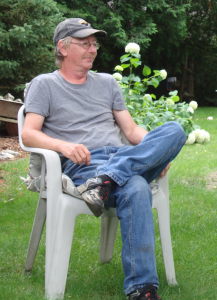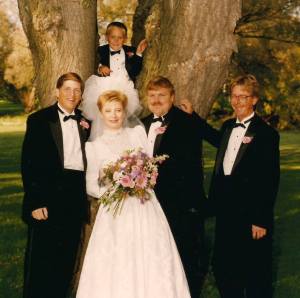I first met Bill Langeveld when I was dating his little sister, Sandra. He had a hilarious, quick wit, dry as dust. Apparently he had inherited this wry wit from his father, Pieter Langeveld, who with his wife Alice had emigrated from Gelderland in the Netherlands to Ontario, Canada. The family lived first in Wallaceburg, a little village known for a Canadian ghost story and as the place where James Paris Lee invented the prototype of the Lee-Enfield rifle. The family later moved to London. He smoked little Colt cigars and enjoyed Canadian beer. When Sandra and I would cross the border at Port Huron / Sarnia, our instructions were to pick up Colts for Bill, Old Ports for his older brother Jack, and CC (Canadian Club) for whoever wanted it. He was in construction, but he had recently lost his job as a construction supervisor. It was not his first loss, or his last.
The second youngest of the Langeveld children, Bill’s brother Walter, had died just short of his nineteenth birthday. He was killed in a motorcycle accident. The family donated his organs; at the time, Walter had donated more organs than any other Canadian, including his heart. Walter’s heart is still beating today, sustaining the life of Maureen Bareneiski of Winnipeg. Bill’s father Pieter worked for Revenue Canada and was auditing the books of the London, Ontario police department. He noticed an entry for flowers purchased for a Winnipeg police officer’s family who had come to London for a heart transplant, soon after Walter’s death, and Pieter broke into tears. That’s how the Langevelds came to know Maureen, the recipient of their son and brother Walter’s heart. Despite this silver lining, Walter’s death at such a young age was, of course, a profound loss to all in the family: his parents, his sisters Enica, Wilma, and Sandra, his brothers Jack and Bill.
Soon after, Pieter himself suffered a massive heart attack, and died at age 63, before he could enjoy retirement. I never met him, but I heard about him every time we visited London. So, by the time I met Bill, he had lost a brother, a father, and his job. When Sandra heard the news that Pieter was in the hospital, she rushed home to London from Calvin College. But she never got the chance to say goodbye to her father.
I asked Bill to stand up for me at our wedding, on October 3, 1992, along with my uncle Jim Porter and best man Larry Hyde. I never had a brother, so I felt like I was gaining two of them, Bill and his older brother Jack. Bill was married to Bonnie, and they had a little boy, Billy. The lived in London, on Heather Crescent, and attended Good News Christian Reformed Church, a small, outreach-driven church, where Bill’s mother Alice served as deacon and later as elder. I remember, as a newly-licensed preacher, leading a service at Good News Church. I got to the pulpit and saw a rickety pile of London telephone books stacked up behind it. On the pulpit was a note, pointing out my lack of vertical virtues. It was Bill, of course. That was the only time I have ever preached in London, except for Billy’s wedding, and last week, when I performed Bill’s funeral. I remember at that time Bill had a bitter dispute with someone from the Dutch CRC community there, and it was something that he could not let go.
Only a few years after our wedding, perhaps less, Bill’s older brother Jack was diagnosed with nasopharyngeal cancer, doubtless a direct result of those Old Port cigars. By 1995, health problems dominated both our families. My own mother, Judith Ellen (Porter) Niles, had been diagnosed with cancer in 1989 and had undergone experimental chemotherapy treatment at USC Norris Cancer Center in Los Angeles. In 1995 my mother began to have health problems again, which turned out to be a recurrence of the cancer. In March of 1995, my uncle Jim Porter, my mother’s brother, was diagnosed with ALS (Lou Gehrig’s Disease) and given about a year to live. My grandfather, Raymond James Porter, had been suffering from an aggressive form of prostate cancer. Sandy’s mother Alice had been diagnosed with multiple myeloma. Our visits to London became hospital visits. On December 31, my mother passed away rather suddenly and unexpectedly. We knew the end was coming, but the doctors told us it was a matter of months, not days (as it turned out). Thus I was back in Michigan when my mother died, studying (or rather trying to study) for my PhD comprehensive exams. Jack and I flew out for the funeral and to bring a few belongings home. I rode with Jack, still undergoing chemotherapy, as he drove a U-Haul truck from my mother’s house in Corona, California to Grand Rapids, Michigan.
Six months later, Jack was in a London hospital, declining rapidly. Sandy and I got the news and rushed to London, but we did not arrive in time. Jack died on July 7, 1996. A week later I got a call from my Grandmother, Winnie Porter. My grandfather had died, July 14, 1996. Sandy’s mother, Alice, was in a palliative care (hospice) hospital. She died in August, 1996. In a nine month period, Sandy and I had lost both our mothers; we lost Jack; I lost my grandfather—all to cancer. Bill had suffered two more devastating blows. Probably the loss of his older brother was the harder blow. Bill had worked with Jack in construction, and I could tell that they were close. They shared that same, dry wit.
But even more losses were to come. Some years later, Bill’s son Billy (his given name is Walter William) was digging a tunnel in the sand when it collapsed on him. He was paralyzed in the accident. Bill worked on an addition to the house on Heather Crescent to make it more wheelchair accessible. Their family now included a daughter, Jordyn.
But these losses were too much for Bill. He never found a job like he had had when he was a construction supervisor. Perfectionism and anxiety were major obstacles for Bill. I think his humor was a survival mechanism to keep the bitterness and depression at bay. It was not entirely successful. Bill drank more and more. Eventually his drinking and depression led to another loss: his marriage. Bill seemed to be unable to let go of bitterness. Forgiveness came hard for Bill, if it came at all.
In the past decade or so, Bill lived as if he did not have much to live for. He stayed at various places, as his body dwindled down to skin and bones. He got kicked out of places, too. He ended up, ultimately, staying at the home of Bob and Yvonne Dunn. He worked a little, on and off, notably for Enica’s husband Art Tolsma. He once attempted to end his pain, which earned him a stay at the psychiatric hospital. Sandy once travelled from Alberta to try to effect an intervention for Bill, but Bill would not admit that he was an alcoholic. “Can you smell it all the way from Alberta?” he asked her. His humor kept him going, but also defended him against the truth about the fact that he was slowly, but surely, killing himself.
Bill did have something to live for in these last years. Two somethings, or someones: Billy and Jory. Unsurprisingly, their relationship was pushed to the limits by Bill’s descent into despair and drink. There were times when they didn’t speak. Bill did not make it to Billy’s wedding, because the night before he had fallen and broken his hip—a mishap likely aided by too many beers and a body made fragile with a steady diet of Labatt’s and Colts. My children remember Bill from our visit to him in the hospital. But in recent years, both Billy and Jory had recovered what they could from the ashes of their father’s life, and they were on better terms with their father, accepting that Bill would not, was not able, to change, or to get better. Bill and Billy worked on projects together. Bill would text Jory at night, writing “I love you. Good night.”
Whatever fool spewed out the trite cliché, “God never gives you more than you can handle,” obviously had little experience with real life and real people. The losses in Bill’s life were too much for him to handle, more than he could bear. But his family loved him anyway. We loved him despite everything. It hurt us that we could not help him, and that he could not help himself. His life had meaning, even if there was no way that one could describe Bill as “successful.”
On the afternoon of Tuesday, June 9, Sandy got a call that Bill was in the hospital. It was serious. Sandy made preparations to go to London. But yet again, it was too late. Once again, we were unable to say goodbye. Bill succumbed to all of the losses in his life. For Sandy and me, bad things seem to happen around the same time. The same afternoon, I got a message that my uncle Jim Porter was in the hospital in serious condition. He had neglected to die in that first year after his ALS diagnosis, and in fact he celebrated 20 years of post-Lou Gehrig’s life last March (2015). His was one of the very rare cases of ALS that progresses very slowly, like that of Stephen Hawking. Jim has been a shotgun shooting coach for young people for many years. At the time of this writing, Jim is still in serious condition; he suffered a heart and attack, and the doctors have given him a permanent feeding tube and a ventilator. It is an ominous turn for the worse.
The days that we spent in London, leading up to the funeral, were a holy time. Loose ends were tied up. Hurts were healed. Questions, if not answered, were laid to rest. There was no awkwardness with Bill’s ex-wife, Bonnie. No one blamed her. An ordeal was over, and yet we mourned the fact that Bill was gone. And the family dealt with it in typical Langeveld fashion.
They cracked jokes.
Bill was cremated, and at the funeral home, someone asked Enica if she would like to have some of the ashes. She replied: “No, I’m trying to downsize. And I have enough dust in my house.” At the funeral home, where we went to view Bill’s body, it didn’t take long for the laughs to start. We heard about how Bill would work with Bob Dunn, whose garage he inhabited, and he would call him “Nancy,” and Bob, in response, dubbed Bill “Alice,” without ever knowing that was the name of Bill’s mother. Dry humor. It’s our way.
At the funeral, Billy and Jory spoke both truth and grace, words that moved Sandy and I deeply. The shallowness and inadequacy of popular Evangelical theology was as evident as the Emperor’s nakedness. Someone had made a comment some weeks earlier to the effect that if Bill had only had Christ in his life, everything might have been different. But who dares say that Christ was not in his life? Perhaps Bill lost his grip on God, and on faith (but perhaps not; I do not know); but in any case, that in no way means that God lost his grip on Bill. Instead of these pious platitudes, we heard the robust message of God’s tenacious, abiding faithfulness, even when we are less than faithful. Jory sang the song, Brokenness Aside. Tthe lyrics captured how we felt about Bill, and his place in God’s hands:
Will Your grace run out if I let You down
’Cause all I know is how to run(’Cause) I am a sinner
If it’s not one thing it’s another
Caught up in words tangled in lies (oh yeah)
But You are a Savior
And You take brokenness aside
And make it beautiful beautiful (oh yeah)
Will You call me child when I tell You lies
‘Cause all I know is how to cryYou make it beautiful You make it beautiful
You make it beautiful You make it beautifulOh You make it beautiful beautiful
Oh Lord You make it beautiful beautiful
In memory of my brother-in-law, Bill (William John) Langeveld, 1961-2015.

